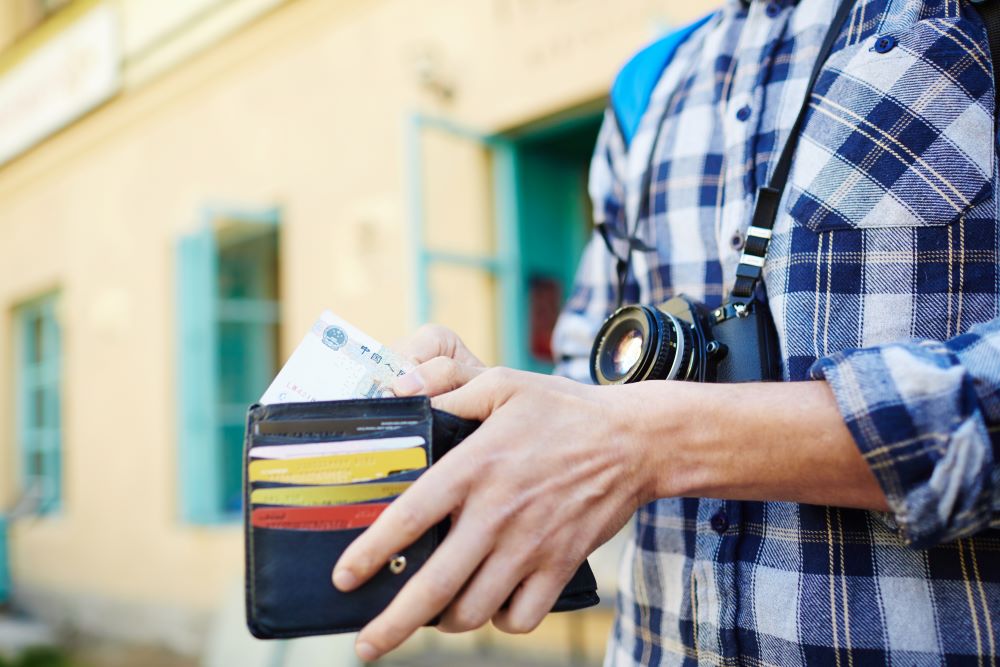The best travel money options: cash vs card

Are you jetting off abroad on holiday this summer? There’s so much to be excited about; sightseeing, good food, relaxing in the sun. Whatever your vacation style, or destination, traveling abroad often involves the critical decision of how to handle your finances.
Should you carry cash, rely on your credit or debit card, or perhaps a mix of both? Understanding your options can help you have a stress-free travel experience, so let’s unpack all the considerations.
Using cash abroad: the traditional choice
The adage ‘cash is king’ is well-founded. Traditionally, popping to the Bureau de Change to get your Euros, Dollars or other foreign currencies is a staple part of holiday preparation.
Using cash abroad still has its merits, even in today’s digital age. While some shops or eateries may be card-only venues since Covid, having cash to hand can be very useful on holiday. From market stalls to street vendors, to tipping staff or venturing to remote locations, sometimes cash is the simplest option for everyone.
What’s more, using cash should mean you won’t get stung by any additional transaction fees and could help you budget over the course of your holiday. Seeing what funds you have physically can help you keep track!
If cash if your preferred payment method on holiday, just take note of a couple of points:
Cash can be bulky. Especially with low value currencies where you’ll end up carrying several bills at a time for just a small value of money.
Carrying large amounts of cash can mean you’re vulnerable to theft. Criminals can spot you leafing through notes or hear your coins jangling, and target you. And once it’s gone, it’s gone!
Using cards on holiday: what you need to know
Credit and debit cards can make travelling easier, especially with modern security features and the ability to freeze or cancel them in the case of loss or theft. You may find that you get better exchange rates, especially if you use a travel-friendly card with no foreign transaction fees, or a prepaid travel card. And sometimes, you might need a card to book excursions or make reservations online or to make larger purchases abroad.
Just make sure you understand the fees that can come from the various card options. Debit, credit, or prepaid cards can come with ATM withdrawal charges, or initial loading fees. These unexpected fees can make it hard to keep track of spending.

A word on travellers cheques
While many people opt for cash or card, some do prefer to use travellers cheques. These pre-printed cheques for fixed amounts can be issued in sterling or foreign currencies, and spent abroad or swapped for local money at banks or Bureaux de Change.
The main benefit of travellers cheques is that they are safer to carry around than cash. So long as you record the serial number of each cheque you were originally issued, you will be able to get them replaced should they be stolen or lost. However, as they are not as popular a payment option compared to other methods, you might find them tricky to exchange.
The best of both worlds
Ultimately, you should use the payment option that’s most convenient for you, but a mixed approach can offer you both flexibility and security. By carrying a small amount of local currency, you can cover things like taxi fares, tips, parking or small purchases. And then you can find a travel-friendly card, with good rates, that will work for bigger transactions.
Travelling safely with your money
Here’s a few money pointers to help you enjoy your holiday.
Inform your bank: always inform your bank of your travel plans to prevent your card from being flagged for suspicious activity.
Limit ATM withdrawals: withdraw larger amounts to minimise fees, but don’t carry too much cash at once.
Carry cards and cash separately: don’t keep all your funds in one place for your own security. Split your payment options up, such as keeping some cash in a money belt and your card in an RFID wallet in your bag.
Monitor exchange rates: monitor exchange rates and plan your currency exchanges for when rates are favourable.
Relax on holiday, knowing you’re covered
When traveling abroad, the choice between cash and card depends on your destination, personal preferences, and spending habits. Cash provides universal acceptance and control over spending, while cards offer security and convenience. Combining both options, can enhance your trip, giving you peace of mind that you’re prepared for any situation.
And for even greater peace of mind, why not talk to one of our travel insurance advisors? Our travel insurance experts can help you find cover that protects you financially if something happens to you while you’re away or before you travel. This could include the costs of cancelling your trip if you become ill and can’t go, the costs of emergency medical treatment whilst you’re away, or if your baggage is lost, damaged or stolen during your trip.
For more help, find your local Howden branch and stop by, or give the team a call.
Sources: Which?, EuroChange, Nerd Wallet







